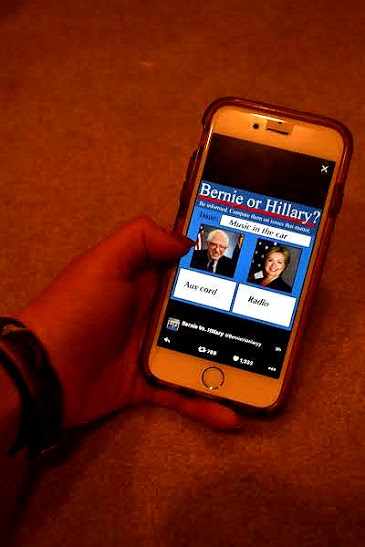The media affects young voters

With the 2016 presidential election around the corner, politics has once again become the center of conversation in many households. Sometimes unintentionally, the media has a tremendously positive impact on young people, especially those who will vote in the upcoming election. Specifically, television shows such as Saturday Night Live and outlets on social media influence and educate millennials about real political issues, even if the intent is satirical.
Saturday Night Live is one of the most famously political comedy television shows. The show has a tendency to poke fun at politicians’ behaviors and has even featured political figures on the program; famous impersonations include Will Ferrell’s George W. Bush, Larry David’s Bernie Sanders, Tina Fey’s Sarah Palin and Kate McKinnon’s Hillary Clinton. Although the skits performed by the SNL cast are written satirically and the political views may be exaggerated, the show is a useful tool for exposing young audiences to politics. In a 2015 sketch, McKinnon jabs at Clinton’s inconsistency on the issue of same-sex marriage. While intended as a joke, the sketch highlights Clinton’s controversially inconsistent views on certain issues. Similar skits have revolved around Donald Trump, Bernie Sanders and other politicians. By blending pop culture and politics, satirical television shows such as SNL creatively expose hundreds of thousands of young people to major tenets of the upcoming election.
Political commentary through social media also positively impacts young voters. Just like SNL, these memes and articles tend to exaggerate the candidates’ political views, but nonetheless may spark an interest in politics. These Internet posts mostly concern presidential candidates Donald Trump, Bernie Sanders, Hillary Clinton and Ted Cruz, and can become viral within a matter of days. A famous meme entitled “Bernie vs. Hillary” creates fake quotes for each candidate on various issues. Whether the memes express Clinton’s “lack of musical knowledge” or “disinterest in pop culture,” they positively affect young voters by initiating an interest in politics. Other memes that roam the Internet are more disturbing. For example, several pictures of Donald Trump’s face cropped onto Adolf Hitler’s body have circulated around Twitter. This picture has accompanied several articles comparing aspects of Trump’s growing popularity to Hitler’s rise to power.
“The Internet and television have definitely made me more aware of political issues,” said sophomore Daniel Edmond.
These small doses of politics appeal to young voters because they make subjects that may normally be uninteresting more understandable. Even though some of these media outlets greatly exaggerate the candidates’ policies, they encourage young people to get involved in politics, whether by prompting them to watch the debates or to fulfill their duties as citizens by going out and voting.
Your donation will support the student journalists of Calabasas High School. Your contribution will allow us to purchase equipment and cover our annual website hosting costs.






